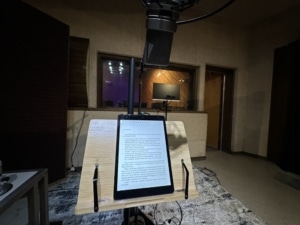I’m done speaking. At last!
Last night, after more hours than I wish to remember, I finally finished recording the audiobook for “Stories Sell: Storyworthy Strategies to Grow Your Business and Brand.”
This was the third audiobook that I have recorded. Professional narrators record my novels, but I have recorded all my nonfiction. After days spent in recording booths and studios, I can tell you this:
Narrating an audiobook is something you’re happy to have done, but you are never happy while actually doing the job.
It’s a grinding slog that demands precision beyond imagination. Word-for-word accuracy is surprisingly challenging when reading aloud. I often needed to re-record a sentence or paragraph because my belly made a sound that I didn’t hear, but the engineer did. Or I shuffled my foot. Or made a funny sound with my mouth. Or breathed too loudly.
It’s grueling work.
That said, when I was recording “Storyworthy” in Grand Haven, Michigan, back in 2018, I met some professional audiobook narrators who love their job and are astoundingly good at it. At one point, my director invited me to meet a woman named Sarah, who was narrating a book in an adjacent studio. I stood in the control booth, listening to an elderly British woman doing a dozen or so voices with astounding rapidity and clarity, rarely flubbing a line.
By contrast, I flub at least three lines per page and often flub the same line repeatedly.
When Sarah emerged from the booth, I was astounded to discover she was actually a 23-year-old woman with a flat, Midwestern accent. She had been attending college when an audiobook company set up a booth on campus to audition students. She was known amongst her friends and family as someone who could replicate accents and invent voices well, so she auditioned on a whim.
It turned out that she could speak in 19 different foreign accents with remarkable accuracy and had a talent for inventing distinct voices and moving between each with ease. So, she left school, and her career as a narrator was born.
Sarah performs her books standing up with a vision board in front of her, where she places magazine cutouts of the faces she imagines on her characters, along with pictures of settings and key objects. Recording is a physical workout for her, and she loves every minute of it.
I do not.
I’m thrilled to have the opportunity and happy to have done the job, but I do not like the job.
But what I’ve discovered from recording these books is this:
Talking is more complicated than I thought.
I grew up outside of Boston with an exceptionally pronounced Boston accent.
Think Matt Damon from “Good Will Hunting.”
When I watch videos of me from that time in my life, I can barely recognize my own voice. It’s astounding how I once spoke.
Then I moved to Connecticut, and over three decades, that accent went away—mostly. People who hear me speak often—Elysha, my kids, and my students—still hear remnants of the accent from time to time—words and phrases that are still missing the letter R. And when I visit my sister or attend a Patriots game, that accent can often return for a bit, as if it’s never left me but is just lying in wait for a chance to reclaim my body and voice.
But in recording my books, it’s clear that my Boston accent is more present than I ever thought. When reading aloud for hours after hours, I came to understand the unconscious effort it takes to speak words without the Boston accent. For example, a word like “Hartford” is never spoken with ease by me. It requires a purposeful effort to include those tricky R sounds in that word.
The accent has never really left me. I’ve just squashed it down so much that I don’t notice the effort required to keep it squashed anymore.
In fact, when I moved to Connecticut, I went to work for the now-defunct Bank of Hartford. On the first day, I answered the phone, “Bank of HahtFid,” and was told to stop answering the phones.
Though I speak the word “Hartford” without the accent today, it still doesn’t come naturally. Many, many words are not spoken with ease but instead require an almost unconscious effort to insert the R sound into the word – a fact that I didn’t know until I began recording books and paying attention to how I speak and noticing how many words cause me trouble:
Any word containing two or more R sounds, in addition to sentences packed with R-laden words.
It’s remarkable how childhood establishes the code for the rest of your life, both in terms of how you see and deal with the world as well as how you speak.
Those first two decades really do determine, in large part, how the next 50-80 years will be lived.
The audiobook version of “Stories Sell: Storyworthy Strategies to Grow Your Business and Brand” will soon be available for preorder.
